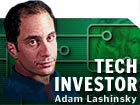|
Don't count out HP/Compaq
|
 |
January 8, 2002: 6:20 p.m. ET
The obstacles get stronger every day. But the deal isn't dead yet.
By Adam Lashinsky
|
SAN FRANCISCO (CNN/Money) - The proposed merger of Hewlett-Packard and Compaq has entered that weird zone where most casual readers assume that the deal's death is a foregone conclusion. The headlines have told the story: 'Hewlett Foundation to vote no.' 'Packard Foundation to vote no.' 'Employees lukewarm on merger.' Etc.
But the deal isn't dead. On the contrary, the two companies continue to fight it out. As I noted in a recent article in Fortune magazine, HP CEO Carly Fiorina and her Compaq counterpart, Michael Capellas, believe they've got plenty of dry powder for the battle with the forces aligned against the merger.
HP's major as-yet-unused weapon is the special proxy it plans to file in coming weeks with the Securities and Exchange Commission, which promises a detailed analysis of why HP thinks the deal is good for shareholders. The proxy filing also will enable management to go public in a no-holds-barred battle against Walter Hewlett, heir of one of the company's co-founders and huge critic of the merger.
The other great hope for the merger is that the institutional shareholders who own shares of both companies would vote for the deal to boost their Compaq positions. Unfortunately, Sanford Bernstein analyst Toni Sacconaghi threw a monkey wrench in that argument Tuesday with a trenchant analysis of the two companies' cross-ownership.
According to Sacconaghi, 79 percent of HP's institutional shareholders also hold Compaq shares. But nearly 70 percent of HP's top 200 shareholders own at least twice as much HP stock, in dollar terms, than Compaq stock. Those shareholders, he concludes, will vote against the deal. All told, Sacconaghi figures that 54 percent of those shareholders most likely to vote (he assumes none of the individuals will vote, and they hold 25 percent of the total) will vote no.
HP's biggest hope, at this point, is time. The conventional wisdom is that HP's shares will rise if it backs out. But that same consensus holds that Fiorina would lose her job in such a situation, thrusting HP -- and its stock -- into uncertainty. And other than merging with Compaq, HP management doesn't seem to have much more of a game plan.
Compaq "surprised" investors Monday by saying it was profitable -- barely -- in the fourth quarter. That's good, of course, but not a whole lot to brag about. A bigger milestone will be HP's performance in the quarter that ends this month. A solid showing from HP would go a long way towards convincing institutional investors that HP management has its act together and deserves the benefit of the doubt on this deal.
So the deal isn't dead -- but a lot still has to go right before you see the following headline: "HP/Compaq merger squeaks through; Now comes the hard part."
Here's something. So Monday AOL Time Warner, parent company of CNN/Money, said it will buy out Bertelsmann's 49 percent interest in AOL Europe for $6.75 billion in cash.
There's just one problem: At last check (the Sept. 30, 2001 balance sheet), AOL had only $1.5 billion in cash. The rest, says, AOL Chief Financial Officer Wayne Pace, will come from "existing and available committed bank and other credit facilities."
Whoah. That means AOL, which has $21 billion in long-term debt already, will be adding more than $5 billion in indebtedness just to pay off Bertelsmann. The old Time Warner, through its cable businesses, was no stranger to debt, but AOL steered clear of such confusion. No longer.
Sign up to receive the Tech Investor column by e-mail.
Plus, see more tech commentary from David Futrelle and Adam Lashinsky, and get the latest tech news. 
|
|
|
|
|
|

|

